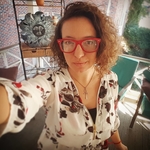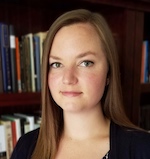2019-20 Mellon Public Scholarship Teaching Fellows
Laney Graduate School is pleased to announce the first cohort of Mellon Interventions Public Scholarship Teaching Fellows for the 2019–20 academic year.
Nick Blood (History)

Course Description
Title: HISTORY385, Journalism and Digital Archives
Time: Spring 2020
Journalism and Digital Archives offers a basic introduction to US journalism history and to research using digital news archives. Students will become familiar with various approaches to thinking about media, information, and communications, learn about the major events and trends in the history of journalism, and consider how historical journalism fits into the emerging fields of public and digital humanities. As they develop a contextual understanding of journalism through readings and class discussion, participants will also gain experience in employing digital archives to conduct original historical research and presenting their results in a publicly-accessible way. This course is funded by the Mellon Interventions Project Public Scholarship Teaching Fellowship.
Amy Butner (Art History)

Course Description
Title: ARTHIST 212, Introduction to Digital Art History
Time: Spring 2020
This course will introduce students to some of the digital humanities and public-facing scholarship opportunities offered by Emory. The art and architecture of ancient Egypt will serve as a case study to allow students to explore the basics of these technologies and their possibilities for future research. Students will be introduced to the principles of ancient Egyptian art history using material from the cemeteries of Saqqara, Thebes, and Amarna. This course is funded by the Mellon Interventions Project Public Scholarship Teaching Fellowship.
Stephanie Koziej (WGSS)

Stephanie Koziej is a PhD Candidate in Women, Gender, and Sexuality Studies and a Psychoanalytic Candidate at Emory’s Psychoanalytic Institute. She is originally from Belgium and holds a Masters and Mphil in Philosophy. Her research focuses on the forgotten concept of tenderness (Zärtlichkeit) in the history of psychoanalysis and its radical potential for rethinking subjectivity, sociality, and the erotic. Her writings combine psychoanalyst, feminist, queer, post-colonial, and affect studies lenses. She also explores tenderness through sound and has created interactive sound installations, soundscapes, songs and music videos with brainwaves, voice, ukulele, and city noises. Her teaching style is equally characterized by an interdisciplinary and multimodal approach. In her classes, students study critical theory in tandem with art, culminating in the creation and exhibition of their own subversive art pieces. For more information, please visit: http://koziejstephanie.wordpress.com/.
Course Description
Title: WGS 285, Sex-Love-Desire, Variable Topics in WGSS - Fall 2019
Time: Fall 2019 - TuThF, 10:00–10:50AM
Location: Woodruff Library 874
Love, sex and desire. Three words that describe strong intimacies between people. But what do these words actually mean? How do they relate to one another? Do they indicate separate phenomena? Or are their delineations not that clear? And could it be possible that their demarcations are used to benefit and award some, and subordinate and marginalize others? Historically, philosophers, sexologists and psychoanalysts have tried to answer what love, sex, and desire are. Yet a variety of critical thinkers in fields like feminist theory, queer theory, post-colonial theory, critical black studies, affect theory and disability studies have stepped up to critique these dominant views and carve out a space for unheard voices and desires.
In this course, we will take a closer look at the history of love, sex and desire, and more specifically their mutual relations. Through carefully selected readings, students will learn to pay attention to the socially constructed nature of ideologies and binaries that govern dominant conceptions of love-sex-desire. Some dyads the course will focus on are: love/desire; Madonna/whore; healthy/perverse; thanatos/eros; genital/non-genital; infantile/adult; sexual/asexual; love/hate; subjectification/de-subjectification; vanilla/kink; civilized/uncivilized. Students will discover the racist, sexist and/or misogynist dimensions of these binaries and learn the importance of complicating binaries into a more fluid approach.
A selection of questions that this course will address are: How does power work on how love, sex and desire have been conceived of historically, politically, and theoretically? What binaries govern theories of love, sex, and/or desire? What is the function of these binaries? Who do they serve, who do they subordinate? What are some methods that are used to complicated and subvert these splits?
To tackle these questions students will build a critical tool-kit that allows them to look at the political dimensions of these binaries, and develop a sensitivity for their sexual, gendered and racial implications. Besides traditionally written articles and books, students will also be presented with the critical potential of both public scholarship (like podcasts, blogs, self-help books and TED-talks) and subversive art (ranging from poetry to music, photography and performance art). The variety of materials will provide students with their own subversive means to tackle a love-sex-desire related binary in their own alternative form project. Students will work all semester to create an art piece, in their medium of choice, accompanied by a critical theory inspired art statement. Subsequently, students and instructor will work together to create a public art exhibition, in which students have the chance to present and discuss their final art projects with a general audience. This course is funded by the Mellon Interventions Project Public Scholarship Teaching Fellowship.
Whitney Ronshagen (Philosophy)

Course Description:
Title: PHIL285, Philosophy of Food
Time: Spring 2020
We live in an age of food anxiety and obsession. At the same time as we have serious food injustices around the world, amplified by climate disasters, we have cultural obsessions with food novelty that render questionable the nature of food itself. In this course, we will examine the centrality of food in our everyday lives and think philosophically about the role of food in shaping identities, the self, social worlds, knowledge, ethics, and artistic engagements. In doing so, this course also serves as an introduction to some core subfields within philosophy (metaphysics, epistemology, ethics, and aesthetics). Throughout the semester, we will use a combination of philosophical analyses, interdisciplinary essays on food, food art, public podcasts on food, and community engagement in order to think critically about the crucial role of food in our lives and what it might mean to eat well. This course is funded by the Mellon Interventions Project Public Scholarship Teaching Fellowship. It will emphasize the importance of public scholarship, and students will learn to practice philosophical inquiry in public-facing ways.